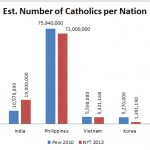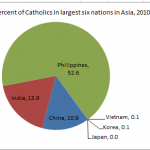Lots of us are thinking and writing with an unusual mixture of heavy heart and curiosity today, with the news of the unusual retirement of a pope. There’s gratefulness for his service and sadness at its forthcoming conclusion, yet without the grief that typically accompanies the news of a new and needed conclave. Since there’s no shortage of content flying around the Internet today, I’ll keep my comments fairly brief. (Well, they were brief when I started…)
For people who’ve disliked Benedict XVI, my hunch is that you shouldn’t read “good news” into this. Benedict XVI’s resignation appears to be because of the global “New Evangelization” he encouraged, in humble recognition that he lacks the energy and health to lead and shepherd it. That’s how I read his letter.
So here are a few interesting facts, a few things to keep in mind, and a few hunches about what’s next. (I could be wrong on a few of these details.)
- It’s pretty interesting that the last time this occurred (1415) was about a hundred years before the Protestant Reformation, and yet two-thirds of Church history still occurred before that time.
- Only cardinals under age 80 are allowed to vote in the conclave, and they typically elect one of their own (although I believe any bishop is technically eligible). One fellow will have turned 80 two days before Benedict XVI’s retirement. According to Wikipedia, which is not infallible (pun intended), there are 118 cardinals eligible to vote.
- The rules around election change upon occasion, and apparently have so recently. Although John Paul II edited the rules to allow for a simple majority to elect the pope in case a super-majority (2/3) could not be reached after numerous efforts—that is, the presence of an entrenched minority—Benedict XVI chose to revert to the previous rules. So, a solid consensus is required here. But I don’t think they will have trouble.
- It’s not obvious to me that particular cardinals wish to be pope. Besides constituting a strike against your candidacy, I suspect the converse is far more likely: many greatly fear it. These are men with monumental obligations already—and not young—and hence the prospect of becoming pope is likely met with considerable trepidation. Bottom line: this is not at all like American Idol. Be glad about that.
- Pope Benedict will apparently return to being known as Cardinal Joseph Ratzinger after Feb 28. I would’ve guessed “Bishop of Rome, Emeritus.” He intends to retire to a monastery, Castel Gandolfo presumably, and I strongly suspect will live largely outside the public eye. He will not participate in the conclave.
- Pope John Paul II was appointed a bishop at the young age of 38 and a cardinal at 47. That’s very uncommon. For comparison, the youngest cardinal today is 53, an Indian, and the first cardinal from the Syro-Malankar rite (in contrast with the Latin rite, the most familiar of them).
- As in 2005, there will be plenty of speculation—more than ever, given social media—about whether the next pope will be non-European. The odds remain against it, just like they remain against any particular cardinal’s election. It will happen eventually. Maybe this time, maybe not. An American? Probably more unlikely. Many of us stateside love our Cardinal Dolan, and think he’s a fine evangelist of the Faith; his election, too, remains unlikely, of course.
- Benedict XVI’s reasoning behind his resignation, as articulated in his letter, suggests one of the few signals here to the college of Cardinals, and that is to elect a more youthful pope. Of course it’s a bit humorous to talk of youth when your youngest member is 53. But my hunch is that our next pope will be no older than age 70. How many cardinals are under 70? 43, by my count. Five Americans are among them. Nine others will be 70 upon his resignation.
- Gerhard Ludwig Müller currently occupies the position from which Benedict XVI become Pope, head of the Congregation for the Doctrine of the Faith. But Müller is not a cardinal, I believe, and therefore unlikely to be selected. His successor is an American, William Levada, but unlikely to be selected due to age (he’s 76).
- Christoph Schönborn, archbishop of Vienna, is a plausible European candidate, especially if the New Evangelization weighs considerably on the conclave. (I predict it will.) He’s an accomplished book author, as was Ratzinger, and is 68 years old.
- If you’re looking for both youth and longevity (as a cardinal), there are 11 cardinals who are under age 70 and were appointed as such by John Paul II. There are no Americans among them. All of the American cardinals under 70 were appointed by Benedict XVI. Which is fine and not a knock against any of them.
- I guess if I had to place a hedge around a baker’s dozen names of cardinals under 70 that I think reflect the spirit of (and experience with) the New Evangelization, some very overtly so, I think it would include these, in no particular order: Robles Ortega, Tagle, Dolan, Schönborn, Bozanic, Turkson, Braz de Aviz, Betori, Filoni, Gracias, Erdö, Pengo, and Onaiyekau. Although this narrows the 118 down to 13, my logic here is complicated, includes some gut instincts, and I’m frankly probably wrong. But hey, I’ll be in good company, since most observers will be incorrect in their guesses.
- Importantly, I know nothing—literally zippo—of the interpersonal relationships the cardinals have with each other, and who might be considered “frontrunners” for their longstanding respect, warm relationships, etc. Keep an eye on Whispers in the Loggia.
And in the end I’ll be pleased with whomever is selected. Indeed, that attracted me to Catholicism in the first place–that I didn’t have to discern and decide so much as to defer to the remarkable wisdom of others. While days like today feel bittersweet, my wife remarked how neat it is to be feeling such sentiment together with Catholics around the world. Our pastor is leaving, and we anticipate his absence with some sadness, yet mixed with confidence.















